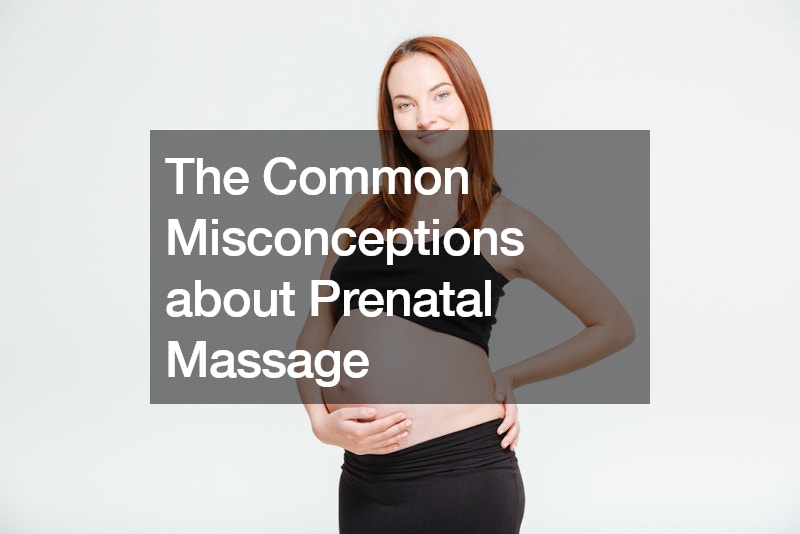Pregnancy is a beautiful journey filled with excitement, anticipation, and of course, physical changes. As your body adapts to nurture new life, aches and pains can become unwelcome companions. Prenatal massage offers a natural and effective way to alleviate these discomforts and promote relaxation during this special time. However, a web of misconceptions can surround prenatal massage, leaving expecting mothers hesitant to explore its benefits.
Let’s debunk some of the most common myths and shed light on the true potential of prenatal massage.
Myth #1: Prenatal Massage is Unsafe in the First Trimester
Many women believe that prenatal massage should be avoided during the first trimester due to concerns about miscarriage. However, this is simply not true. Studies have shown no link between prenatal massage and miscarriage. In fact, a qualified massage therapist trained in prenatal massage techniques can safely address aches and pains even in the early stages of pregnancy, provided there are no high-risk factors or specific medical contraindications. It’s important to choose a therapist who is comfortable working with pregnant women and to communicate openly about any concerns you may have.
Myth #2: Massage Can Cause Miscarriage
This misconception likely stems from a misunderstanding of miscarriage itself. Miscarriage is a complex biological process often caused by chromosomal abnormalities in the developing fetus. Massage therapy cannot disrupt a healthy pregnancy. The pressure used in prenatal massage is gentle and focused on relaxation, not manipulation of the uterus.
Myth #3: Abdominal and Lower Back Massage are Off-Limits
While some massage therapists choose to avoid direct abdominal massage in the first trimester for comfort reasons, it’s not necessarily contraindicated. In later trimesters, with the client’s permission, a light touch can be used on the abdomen to address discomfort or bloating. Similarly, lower back massage is safe throughout pregnancy. A qualified therapist will use light to moderate pressure to ease aches and tension in this area.
Myth #4: Prenatal Massage Can Boost Fertility
The desire to conceive can be an emotional rollercoaster, and some massage therapists may advertise “fertility massage” as a solution. It’s important to understand that infertility is often a multi-factorial issue, and massage therapy cannot address all its underlying causes. While prenatal massage techniques can promote relaxation and potentially improve circulation, they do not directly influence fertility.
Myth #5: Certain Massage Points Can Induce Labor
There’s a persistent belief that specific pressure points on the feet, ankles, or lower back can trigger labor. While these reflex points do exist in reflexology and acupressure, activating them requires sustained pressure for an extended period, which is not typical in a prenatal massage session. Licensed massage therapists understand the importance of not interfering with the natural course of pregnancy, and their focus remains on relaxation and pain relief.
The Benefits of Prenatal Massage
Having cleared the air about these misconceptions, let’s explore the genuine benefits of prenatal massage:
- Reduced Muscle Tension and Pain: Pregnancy can cause aches and pains in the lower back, shoulders, and legs. Prenatal massage techniques target these areas, promoting relaxation and reducing tension buildup.
- Improved Sleep: The physical changes and anxieties of pregnancy can disrupt sleep patterns. Prenatal massage can help by promoting relaxation and reducing stress hormones, leading to deeper and more restful sleep.
- Alleviated Edema (Swelling): Fluid retention is a common occurrence during pregnancy. Prenatal massage techniques that promote lymphatic drainage can help reduce swelling in the legs and feet.
- Reduced Stress and Anxiety: Pregnancy can be a time of emotional ups and downs. Prenatal massage offers a nurturing and relaxing experience, promoting emotional well-being and reducing stress hormones.
- Improved Circulation: Prenatal massage can help improve blood circulation, which can benefit both mother and baby by delivering essential nutrients and oxygen more efficiently.
- Preparation for Labor: Prenatal massage can help to prepare your body for labor by increasing flexibility and reducing tension in the lower back and pelvic area.
Finding the Right Prenatal Massage Therapist
To reap the full benefits of prenatal massage and ensure a safe and comfortable experience, it’s crucial to find a qualified therapist. Look for a therapist who has received specific training in prenatal massage techniques. Consider asking your doctor for a referral or searching for therapists certified by a reputable organization specializing in pregnancy massage.
During your first appointment, communicate openly about your pregnancy stage, any medical conditions, and any specific areas of concern. A qualified therapist will tailor the massage session to your individual needs and ensure a safe and relaxing experience.
Conclusion
Pregnancy is a time to embrace self-care and prioritize your well-being. Prenatal massage can be a valuable tool in supporting a healthy and comfortable pregnancy. By dispelling the myths and understanding the genuine benefits, you can make an informed decision about incorporating prenatal massage into your prenatal journey.
.


